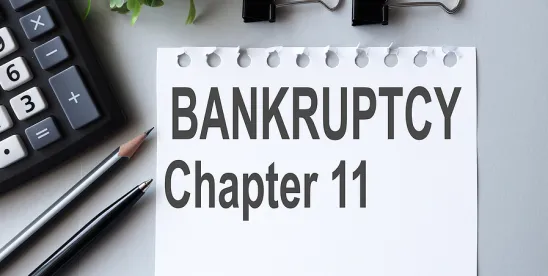When a business files for Chapter 11 bankruptcy, the first significant event is the ‘first day hearing.’ This hearing is crucial for stabilizing the debtor’s operations and setting the tone for the case. It involves presenting various motions to the bankruptcy court to obtain immediate relief necessary for the debtor to continue its business operations.
Maria Carr of McDonald Hopkins explains that the first-day hearing is not just a procedural formality; it is a strategic opportunity to lay the groundwork for the debtor’s future.
Notice and Service Requirements
Before the first-day hearing, the debtor must provide notice of the hearing and the motions to key stakeholders, including:
- US Trustee: The federal official responsible for overseeing the administration of bankruptcy cases.
- Secured Creditors: Creditors with liens on the debtor’s assets.
- Top Unsecured Creditors: Typically, the 20 largest unsecured creditors.
- Government Agencies: Examples include the Internal Revenue Service and state taxing authorities.
Providing timely and adequate notice ensures that interested parties have an opportunity to be heard and protects the integrity of the bankruptcy process.
The First Day Hearing
The first day hearing typically occurs within a few days of filing the Chapter 11 petition. During this hearing, the debtor seeks court approval for several motions, collectively known as ‘first day motions,’ that are essential for maintaining business continuity. These motions address both administrative and operational aspects of the debtor’s business.
As Ryan Bennett of Kirkland & Ellis notes, “The goal is to ensure the company has a soft landing in Chapter 11.” By obtaining immediate relief through first-day motions, the debtor can minimize disruptions and work towards a successful reorganization.
Administrative First Day Motions
Administrative motions are procedural requests that help streamline the bankruptcy process. These motions are generally non-controversial and are granted to facilitate the efficient administration of the bankruptcy case.
Common administrative motions include:
- Joint Administration: If multiple affiliated entities file for bankruptcy, they may request joint administration to consolidate their cases for procedural purposes.
- Extension of Time to File Schedules and Statements: Debtors often need additional time beyond the standard 14 days to prepare comprehensive financial disclosures.
- Retention of Professionals: Debtors seek court approval to retain attorneys, financial advisors, and other professionals necessary for the bankruptcy case.
- Appointment of Claims and Noticing Agent: In large cases, a third-party agent may be appointed to handle the distribution of notices and manage claims.
Operational First Day Motions
Operational motions are critical for the debtor to maintain business operations during the bankruptcy process. These motions are vital for preserving the value of the debtor’s business and ensuring a smooth transition into Chapter 11.
Key operational motions include:
- Wages and Benefits: Debtors request permission to pay prepetition wages, salaries, and benefits to employees to maintain morale and prevent attrition. As Matt Christensen of Johnson May notes, “You need to pay people to keep them working.”
- Critical Vendor Payments: Debtors may seek to pay certain essential suppliers whose goods or services are vital to ongoing operations.
- Utilities: Debtors request to continue utility services without interruption and may offer adequate assurance payments to utility providers.
- Customer Programs: Debtors seek to maintain customer loyalty programs, warranties, and gift cards to preserve customer relationships.
- Insurance and Taxes: Debtors request authority to continue paying insurance premiums and certain taxes that are essential for operations.
Financing the Bankruptcy
A critical aspect of the first day hearing involves securing financing to fund operations during the bankruptcy case. This includes both Debtor-in-Possession (DIP) Financing and Cash Collateral.
Under DIP Financing, debtors may seek new financing to support operations. This financing is typically given priority over existing debt and requires court approval. If the debtor’s cash is subject to liens from secured creditors, the debtor must obtain court approval to use this cash, known as cash collateral, for operations.
As Benjamin Wallen of Pachulski Stang Ziehl & Jones observes, “It can be game over quickly. No cash means no payroll, no rent, no business.” Therefore, obtaining court approval for DIP financing and use of cash collateral is often a top priority at the first-day hearing.
The First Day Declaration
Accompanying the first-day motion is the ‘first-day declaration,’ a sworn statement by a senior executive, such as the Chief Financial Officer (CFO) or Chief Restructuring Officer (CRO). This declaration provides the court with background information on the debtor’s financial condition, the circumstances leading to the bankruptcy filing, and the necessity of the requested relief.
The first-day declaration serves as the evidentiary foundation for the relief sought in the first-day motions, offering transparency and context to the court and stakeholders.
Conclusion
The first day hearing in a Chapter 11 bankruptcy case is a pivotal event that sets the stage for the debtor’s reorganization efforts. By obtaining court approval for essential administrative and operational motions, the debtor can stabilize operations, maintain stakeholder confidence, and work towards a successful restructuring.
To learn more about this topic, view The Nuts & Bolts Of Chapter 11 (Series I) / The Nuts & Bolts of a First Day Hearing. The quoted remarks referenced in this article were made either during this webinar or shortly thereafter during post-webinar interviews with the panelists. Readers may also be interested to read other articles about Chapter 11.
This article was originally published here.
©2025. DailyDACTM, LLC. This article is subject to the disclaimers found here.



 />i
/>i
